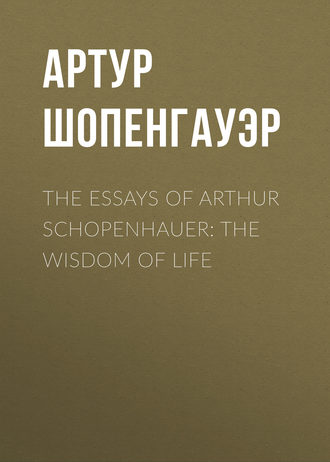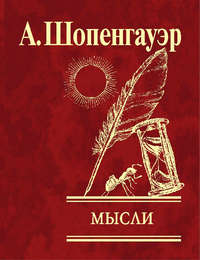 полная версия
полная версияThe Essays of Arthur Schopenhauer: the Wisdom of Life
It will generally be found that those who know what it is to have been in need and destitution are very much less afraid of it, and consequently more inclined to extravagance, than those who know poverty only by hearsay. People who have been born and bred in good circumstances are as a rule much more careful about the future, more economical, in fact, than those who, by a piece of good luck, have suddenly passed from poverty to wealth. This looks as if poverty were not really such a very wretched thing as it appears from a distance. The true reason, however, is rather the fact that the man who has been born into a position of wealth comes to look upon it as something without which he could no more live than he could live without air; he guards it as he does his very life; and so he is generally a lover of order, prudent and economical. But the man who has been born into a poor position looks upon it as the natural one, and if by any chance he comes in for a fortune, he regards it as a superfluity, something to be enjoyed or wasted, because, if it comes to an end, he can get on just as well as before, with one anxiety the less; or, as Shakespeare says in Henry VI.,31
… the adage must be verified That beggars mounted run their horse to death.
But it should be said that people of this kind have a firm and excessive trust, partly in fate, partly in the peculiar means which have already raised them out of need and poverty, – a trust not only of the head, but of the heart also; and so they do not, like the man born rich, look upon the shallows of poverty as bottomless, but console themselves with the thought that once they have touched ground again, they can take another upward flight. It is this trait in human character which explains the fact that women who were poor before their marriage often make greater claims, and are more extravagant, than those who have brought their husbands a rich dowry; because, as a rule, rich girls bring with them, not only a fortune, but also more eagerness, nay, more of the inherited instinct, to preserve it, than poor girls do. If anyone doubts the truth of this, and thinks that it is just the opposite, he will find authority for his view in Ariosto's first Satire; but, on the other hand, Dr. Johnson agrees with my opinion. A woman of fortune, he says, being used to the handling of money, spends it judiciously; but a woman who gets the command of money for the first time upon her marriage, has such a gusto in spending it, that she throws it away with great profusion.32 And in any case let me advise anyone who marries a poor girl not to leave her the capital but only the interest, and to take especial care that she has not the management of the children's fortune.
I do not by any means think that I am touching upon a subject which is not worth my while to mention when I recommend people to be careful to preserve what they have earned or inherited. For to start life with just as much as will make one independent, that is, allow one to live comfortably without having to work – even if one has only just enough for oneself, not to speak of a family – is an advantage which cannot be over-estimated; for it means exemption and immunity from that chronic disease of penury, which fastens on the life of man like a plague; it is emancipation from that forced labor which is the natural lot of every mortal. Only under a favorable fate like this can a man be said to be born free, to be, in the proper sense of the word, sui juris, master of his own time and powers, and able to say every morning, This day is my own. And just for the same reason the difference between the man who has a hundred a year and the man who has a thousand, is infinitely smaller than the difference between the former and a man who has nothing at all. But inherited wealth reaches its utmost value when it falls to the individual endowed with mental powers of a high order, who is resolved to pursue a line of life not compatible with the making of money; for he is then doubly endowed by fate and can live for his genius; and he will pay his debt to mankind a hundred times, by achieving what no other could achieve, by producing some work which contributes to the general good, and redounds to the honor of humanity at large. Another, again, may use his wealth to further philanthropic schemes, and make himself well-deserving of his fellowmen. But a man who does none of these things, who does not even try to do them, who never attempts to learn the rudiments of any branch of knowledge so that he may at least do what he can towards promoting it – such a one, born as he is into riches, is a mere idler and thief of time, a contemptible fellow. He will not even be happy, because, in his case, exemption from need delivers him up to the other extreme of human suffering, boredom, which is such martyrdom to him, that he would have been better off if poverty had given him something to do. And as he is bored he is apt to be extravagant, and so lose the advantage of which he showed himself unworthy. Countless numbers of people find themselves in want, simply because, when they had money, they spent it only to get momentary relief from the feeling of boredom which oppressed them.
It is quite another matter if one's object is success in political life, where favor, friends and connections are all-important, in order to mount by their aid step by step on the ladder of promotion, and perhaps gain the topmost rung. In this kind of life, it is much better to be cast upon the world without a penny; and if the aspirant is not of noble family, but is a man of some talent, it will redound to his advantage to be an absolute pauper. For what every one most aims at in ordinary contact with his fellows is to prove them inferior to himself; and how much more is this the case in politics. Now, it is only an absolute pauper who has such a thorough conviction of his own complete, profound and positive inferiority from every point of view, of his own utter insignificance and worthlessness, that he can take his place quietly in the political machine.33 He is the only one who can keep on bowing low enough, and even go right down upon his face if necessary; he alone can submit to everything and laugh at it; he alone knows the entire worthlessness of merit; he alone uses his loudest voice and his boldest type whenever he has to speak or write of those who are placed over his head, or occupy any position of influence; and if they do a little scribbling, he is ready to applaud it as a masterwork. He alone understands how to beg, and so betimes, when he is hardly out of his boyhood, he becomes a high priest of that hidden mystery which Goethe brings to light.
Uber's NiederträchtigeNiemand sich beklage:Denn es ist das MachtigeWas man dir auch sage:– it is no use to complain of low aims; for, whatever people may say, they rule the world.
On the other hand, the man who is born with enough to live upon is generally of a somewhat independent turn of mind; he is accustomed to keep his head up; he has not learned all the arts of the beggar; perhaps he even presumes a little upon the possession of talents which, as he ought to know, can never compete with cringing mediocrity; in the long run he comes to recognize the inferiority of those who are placed over his head, and when they try to put insults upon him, he becomes refractory and shy. This is not the way to get on in the world. Nay, such a man may at least incline to the opinion freely expressed by Voltaire: We have only two days to live; it is not worth our while to spend them in cringing to contemptible rascals. But alas! let me observe by the way, that contemptible rascal is an attribute which may be predicated of an abominable number of people. What Juvenal says – it is difficult to rise if your poverty is greater than your talent —
Haud facile emergunt quorum virtutibus obstatRes angusta domi—is more applicable to a career of art and literature than to a political and social ambition.
Wife and children I have not reckoned amongst a man's possessions: he is rather in their possession. It would be easier to include friends under that head; but a man's friends belong to him not a whit more than he belongs to them.
CHAPTER IV
POSITION, OR A MAN'S PLACE IN THE ESTIMATION OF OTHERS
Section 1. – Reputation.
By a peculiar weakness of human nature, people generally think too much about the opinion which others form of them; although the slightest reflection will show that this opinion, whatever it may be, is not in itself essential to happiness. Therefore it is hard to understand why everybody feels so very pleased when he sees that other people have a good opinion of him, or say anything flattering to his vanity. If you stroke a cat, it will purr; and, as inevitably, if you praise a man, a sweet expression of delight will appear on his face; and even though the praise is a palpable lie, it will be welcome, if the matter is one on which he prides himself. If only other people will applaud him, a man may console himself for downright misfortune or for the pittance he gets from the two sources of human happiness already discussed: and conversely, it is astonishing how infallibly a man will be annoyed, and in some cases deeply pained, by any wrong done to his feeling of self-importance, whatever be the nature, degree, or circumstances of the injury, or by any depreciation, slight, or disregard.
If the feeling of honor rests upon this peculiarity of human nature, it may have a very salutary effect upon the welfare of a great many people, as a substitute for morality; but upon their happiness, more especially upon that peace of mind and independence which are so essential to happiness, its effect will be disturbing and prejudicial rather than salutary. Therefore it is advisable, from our point of view, to set limits to this weakness, and duly to consider and rightly to estimate the relative value of advantages, and thus temper, as far as possible, this great susceptibility to other people's opinion, whether the opinion be one flattering to our vanity, or whether it causes us pain; for in either case it is the same feeling which is touched. Otherwise, a man is the slave of what other people are pleased to think, – and how little it requires to disconcert or soothe the mind that is greedy of praise:
Sic leve, sic parvum est, animum quod laudis avarum Subruit ac reficit.34
Therefore it will very much conduce to our happiness if we duly compare the value of what a man is in and for himself with what he is in the eyes of others. Under the former conies everything that fills up the span of our existence and makes it what it is, in short, all the advantages already considered and summed up under the heads of personality and property; and the sphere in which all this takes place is the man's own consciousness. On the other hand, the sphere of what we are for other people is their consciousness, not ours; it is the kind of figure we make in their eyes, together with the thoughts which this arouses.35 But this is something which has no direct and immediate existence for us, but can affect us only mediately and indirectly, so far, that is, as other people's behavior towards us is directed by it; and even then it ought to affect us only in so far as it can move us to modify what we are in and for ourselves. Apart from this, what goes on in other people's consciousness is, as such, a matter of indifference to us; and in time we get really indifferent to it, when we come to see how superficial and futile are most people's thoughts, how narrow their ideas, how mean their sentiments, how perverse their opinions, and how much of error there is in most of them; when we learn by experience with what depreciation a man will speak of his fellow, when he is not obliged to fear him, or thinks that what he says will not come to his ears. And if ever we have had an opportunity of seeing how the greatest of men will meet with nothing but slight from half-a-dozen blockheads, we shall understand that to lay great value upon what other people say is to pay them too much honor.
At all events, a man is in a very bad way, who finds no source of happiness in the first two classes of blessings already treated of, but has to seek it in the third, in other words, not in what he is in himself, but in what he is in the opinion of others. For, after all, the foundation of our whole nature, and, therefore, of our happiness, is our physique, and the most essential factor in happiness is health, and, next in importance after health, the ability to maintain ourselves in independence and freedom from care. There can be no competition or compensation between these essential factors on the one side, and honor, pomp, rank and reputation on the other, however much value we may set upon the latter. No one would hesitate to sacrifice the latter for the former, if it were necessary. We should add very much to our happiness by a timely recognition of the simple truth that every man's chief and real existence is in his own skin, and not in other people's opinions; and, consequently, that the actual conditions of our personal life, – health, temperament, capacity, income, wife, children, friends, home, are a hundred times more important for our happiness than what other people are pleased to think of us: otherwise we shall be miserable. And if people insist that honor is dearer than life itself, what they really mean is that existence and well-being are as nothing compared with other people's opinions. Of course, this may be only an exaggerated way of stating the prosaic truth that reputation, that is, the opinion others have of us, is indispensable if we are to make any progress in the world; but I shall come back to that presently. When we see that almost everything men devote their lives to attain, sparing no effort and encountering a thousand toils and dangers in the process, has, in the end, no further object than to raise themselves in the estimation of others; when we see that not only offices, titles, decorations, but also wealth, nay, even knowledge36 and art, are striven for only to obtain, as the ultimate goal of all effort, greater respect from one's fellowmen, – is not this a lamentable proof of the extent to which human folly can go? To set much too high a value on other people's opinion is a common error everywhere; an error, it may be, rooted in human nature itself, or the result of civilization, and social arrangements generally; but, whatever its source, it exercises a very immoderate influence on all we do, and is very prejudicial to our happiness. We can trace it from a timorous and slavish regard for what other people will say, up to the feeling which made Virginius plunge the dagger into his daughter's heart, or induces many a man to sacrifice quiet, riches, health and even life itself, for posthumous glory. Undoubtedly this feeling is a very convenient instrument in the hands of those who have the control or direction of their fellowmen; and accordingly we find that in every scheme for training up humanity in the way it should go, the maintenance and strengthening of the feeling of honor occupies an important place. But it is quite a different matter in its effect on human happiness, of which it is here our object to treat; and we should rather be careful to dissuade people from setting too much store by what others think of them. Daily experience shows us, however, that this is just the mistake people persist in making; most men set the utmost value precisely on what other people think, and are more concerned about it than about what goes on in their own consciousness, which is the thing most immediately and directly present to them. They reverse the natural order, – regarding the opinions of others as real existence and their own consciousness as something shadowy; making the derivative and secondary into the principal, and considering the picture they present to the world of more importance than their own selves. By thus trying to get a direct and immediate result out of what has no really direct or immediate existence, they fall into the kind of folly which is called vanity– the appropriate term for that which has no solid or instrinsic value. Like a miser, such people forget the end in their eagerness to obtain the means.
The truth is that the value we set upon the opinion of others, and our constant endeavor in respect of it, are each quite out of proportion to any result we may reasonably hope to attain; so that this attention to other people's attitude may be regarded as a kind of universal mania which every one inherits. In all we do, almost the first thing we think about is, what will people say; and nearly half the troubles and bothers of life may be traced to our anxiety on this score; it is the anxiety which is at the bottom of all that feeling of self-importance, which is so often mortified because it is so very morbidly sensitive. It is solicitude about what others will say that underlies all our vanity and pretension, yes, and all our show and swagger too. Without it, there would not be a tenth part of the luxury which exists. Pride in every form, point d'honneur and punctilio, however varied their kind or sphere, are at bottom nothing but this – anxiety about what others will say – and what sacrifices it costs! One can see it even in a child; and though it exists at every period of life, it is strongest in age; because, when the capacity for sensual pleasure fails, vanity and pride have only avarice to share their dominion. Frenchmen, perhaps, afford the best example of this feeling, and amongst them it is a regular epidemic, appearing sometimes in the most absurd ambition, or in a ridiculous kind of national vanity and the most shameless boasting. However, they frustrate their own gains, for other people make fun of them and call them la grande nation.
By way of specially illustrating this perverse and exuberant respect for other people's opinion, let me take passage from the Times of March 31st, 1846, giving a detailed account of the execution of one Thomas Wix, an apprentice who, from motives of vengeance, had murdered his master. Here we have very unusual circumstances and an extraordinary character, though one very suitable for our purpose; and these combine to give a striking picture of this folly, which is so deeply rooted in human nature, and allow us to form an accurate notion of the extent to which it will go. On the morning of the execution, says the report, the rev. ordinary was early in attendance upon him, but Wix, beyond a quiet demeanor, betrayed no interest in his ministrations, appearing to feel anxious only to acquit himself "bravely" before the spectators of his ignomininous end… In the procession Wix fell into his proper place with alacrity, and, as he entered the Chapel-yard, remarked, sufficiently loud to be heard by several persons near him, "Now, then, as Dr. Dodd said, I shall soon know the grand secret." On reaching the scaffold, the miserable wretch mounted the drop without the slightest assistance, and when he got to the centre, he bowed to the spectators twice, a proceeding which called forth a tremendous cheer from the degraded crowd beneath.
This is an admirable example of the way in which a man, with death in the most dreadful form before his very eyes, and eternity beyond it, will care for nothing but the impression he makes upon a crowd of gapers, and the opinion he leaves behind him in their heads. There was much the same kind of thing in the case of Lecompte, who was executed at Frankfurt, also in 1846, for an attempt on the king's life. At the trial he was very much annoyed that he was not allowed to appear, in decent attire, before the Upper House; and on the day of the execution it was a special grief to him that he was not permitted to shave. It is not only in recent times that this kind of thing has been known to happen. Mateo Aleman tells us, in the Introduction to his celebrated romance, Juzman de Alfarache, that many infatuated criminals, instead of devoting their last hours to the welfare of their souls, as they ought to have done, neglect this duty for the purpose of preparing and committing to memory a speech to be made from the scaffold.
I take these extreme cases as being the best illustrations to what I mean; for they give us a magnified reflection of our own nature. The anxieties of all of us, our worries, vexations, bothers, troubles, uneasy apprehensions and strenuous efforts are due, in perhaps the large majority of instances, to what other people will say; and we are just as foolish in this respect as those miserable criminals. Envy and hatred are very often traceable to a similar source.
Now, it is obvious that happiness, which consists for the most part in peace of mind and contentment, would be served by nothing so much as by reducing this impulse of human nature within reasonable limits, – which would perhaps make it one fiftieth part of what it is now. By doing so, we should get rid of a thorn in the flesh which is always causing us pain. But it is a very difficult task, because the impulse in question is a natural and innate perversity of human nature. Tacitus says, The lust of fame is the last that a wise man shakes off37 The only way of putting an end to this universal folly is to see clearly that it is a folly; and this may be done by recognizing the fact that most of the opinions in men's heads are apt to be false, perverse, erroneous and absurd, and so in themselves unworthy of attention; further, that other people's opinions can have very little real and positive influence upon us in most of the circumstances and affairs of life. Again, this opinion is generally of such an unfavorable character that it would worry a man to death to hear everything that was said of him, or the tone in which he was spoken of. And finally, among other things, we should be clear about the fact that honor itself has no really direct, but only an indirect, value. If people were generally converted from this universal folly, the result would be such an addition to our piece of mind and cheerfulness as at present seems inconceivable; people would present a firmer and more confident front to the world, and generally behave with less embarrassment and restraint. It is observable that a retired mode of life has an exceedingly beneficial influence on our peace of mind, and this is mainly because we thus escape having to live constantly in the sight of others, and pay everlasting regard to their casual opinions; in a word, we are able to return upon ourselves. At the same time a good deal of positive misfortune might be avoided, which we are now drawn into by striving after shadows, or, to speak more correctly, by indulging a mischievous piece of folly; and we should consequently have more attention to give to solid realities and enjoy them with less interruption that at present. But [Greek: chalepa ga kala] – what is worth doing is hard to do.
Section 2. – Pride.
The folly of our nature which we are discussing puts forth three shoots, ambition, vanity and pride. The difference between the last two is this: pride is an established conviction of one's own paramount worth in some particular respect; while vanity is the desire of rousing such a conviction in others, and it is generally accompanied by the secret hope of ultimately coming to the same conviction oneself. Pride works from within; it is the direct appreciation of oneself. Vanity is the desire to arrive at this appreciation indirectly, from without. So we find that vain people are talkative, proud, and taciturn. But the vain person ought to be aware that the good opinion of others, which he strives for, may be obtained much more easily and certainly by persistent silence than by speech, even though he has very good things to say. Anyone who wishes to affect pride is not therefore a proud man; but he will soon have to drop this, as every other, assumed character.
It is only a firm, unshakeable conviction of pre-eminent worth and special value which makes a man proud in the true sense of the word, – a conviction which may, no doubt, be a mistaken one or rest on advantages which are of an adventitious and conventional character: still pride is not the less pride for all that, so long as it be present in real earnest. And since pride is thus rooted in conviction, it resembles every other form of knowledge in not being within our own arbitrament. Pride's worst foe, – I mean its greatest obstacle, – is vanity, which courts the applause of the world in order to gain the necessary foundation for a high opinion of one's own worth, whilst pride is based upon a pre-existing conviction of it.









